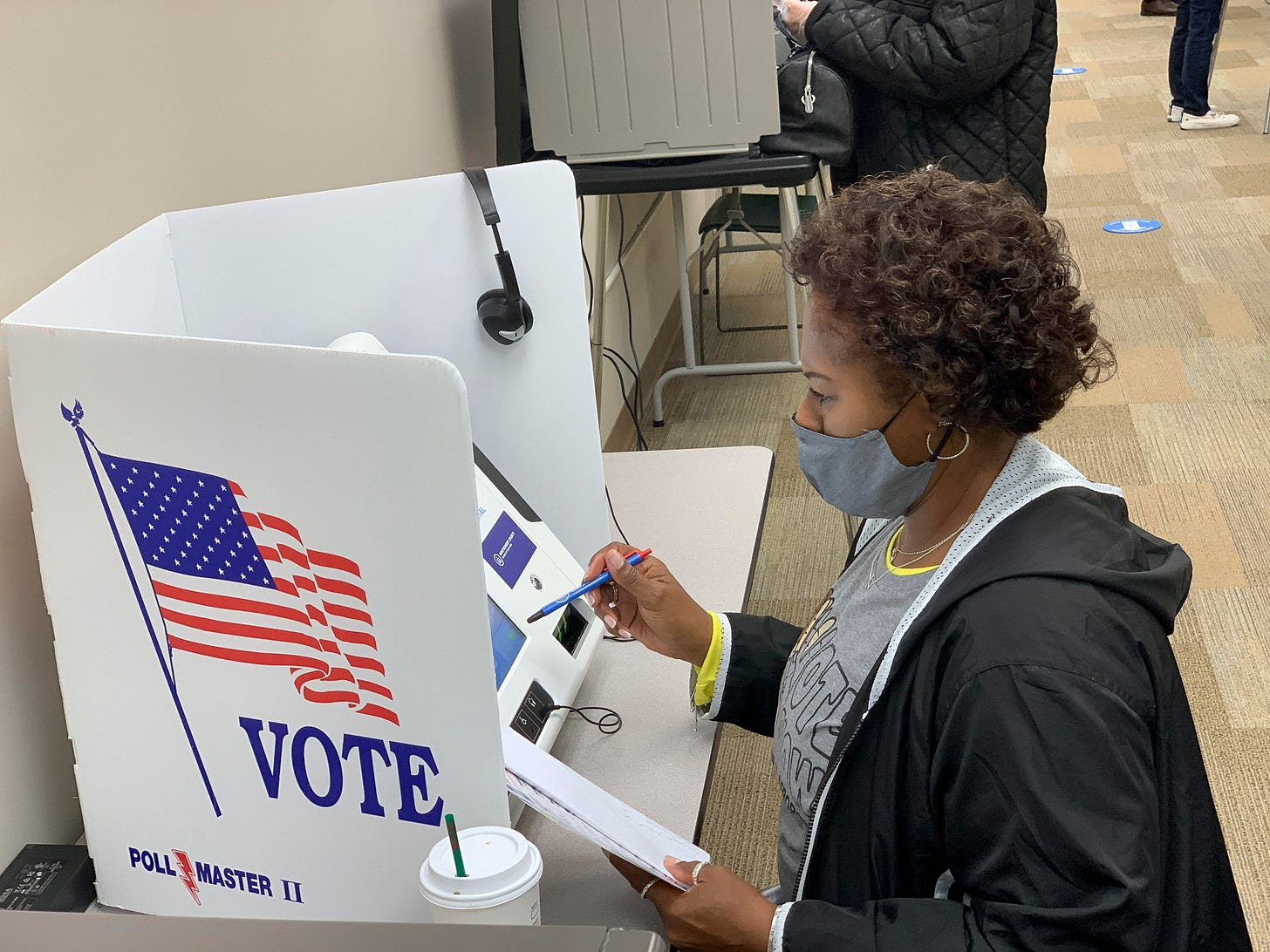
He’s back – back on primetime (thanks, CNN), back astride the Republican Party, and quite possibly back in the White House after 2024. Whatever you or I may think about that, and my thoughts are mostly unprintable, it could happen. His second term would be an ugly spectacle. It’s hard to look away – but I’m trying. To the extent that we remain transfixed by Trump, we risk ignoring the greater threat to our democracy: the buildup of far-right power in the states.
We could see it coming. Since the late 1980s, the GOP has invested heavily in state-level fundraising and organizing. In 2010 the party launched the REDMAP strategy to flip statehouses and hold them through redistricting. Today Republicans control 28 state legislatures while Democrats control 19 (the Virginia and Pennsylvania legislatures are split, and Nebraska’s is nonpartisan). Republicans hold a trifecta in 22 states, controlling both legislative chambers and the governorship. These GOP strongholds are largely dominated by the extreme MAGA wing of the party.
Many Americans can’t even name their state legislator, and with the closure of local newspapers, voters know less and less about what goes on in the statehouses. Yet the decisions made there affect not just life in the states but national politics, too. A look at four states helps reveal what’s at stake.

Texas: Republican trifecta
Red states are moving quickly to prohibit abortions, remove restrictions on guns, ban books, censor teachers, restrict the rights of LGBTQ people, erode the separation between church and state, and make it more difficult to vote. Most such policies don’t have majority support in the country and couldn’t pass the US Congress. But they can fly through GOP-controlled state legislatures.
Take Texas. The state outlaws almost all abortions, and doctors can face life in prison if they perform one. Texans can carry loaded handguns in public without a permit or training. Many Texans, including some in law enforcement, don’t support permitless carry, but the legislature rammed it through in 2021. Texas has banned more books from school libraries than any other state. And the list goes on.
Ohio: Extreme gerrymandering
My dad lives in Ohio, and I visit there often. He lives in a blue college town, but as soon as you go outside the town limits, Trump signs sprout by the roadside.
There’s no doubt that some parts of the country are more conservative than others. But it’s also true that some legislatures are even more solidly red than their own states. Ohio, once a swing state, now leans slightly Republican in terms of its electorate. Trump won 54% of the Ohio vote in 2020. But Republicans hold a supermajority in the state legislature, as well as the governorship. As a result, Ohio Republicans can pretty much do whatever they want. Ohio’s delegation to the US House of Representatives has 10 Republicans and 5 Democrats – a two-to-one advantage that far exceeds the Republican margin in statewide votes.
How’d this happen? Ohio is one of the most heavily gerrymandered states in the nation. Each state redraws its legislative and congressional district maps every 10 years, and in states where the legislature controls the process, the party that controls the legislature can lock in its own advantage for a decade. In 2011, Republican operatives met secretly in a Columbus hotel room they called “the bunker,” where they drew heavily biased maps. This produced districts like Ohio’s 4th, a weird duck-shaped conglomeration represented in Congress by the loathsome Jim Jordan. The 2021 redistricting produced new maps that were just as skewed, so the GOP retains its grip on Ohio’s legislature and congressional delegation.
It’s not just Ohio. Partisan gerrymanders have turned many legislatures into bastions of Republican control. Democrats engage in gerrymandering too, but the GOP has used it more aggressively in recent years. A nationwide fight for fair maps has made some gains, but there’s a long way to go.

What it means for 2024
Those of us who don’t live in red states may think their laws don’t affect us. But Republican state legislators are already working to sway the races for the White House and Congress in 2024.
Citing baseless claims of fraud, red-state legislatures have passed a slew of laws that make it harder for eligible Americans to vote. These laws restrict voter registration, purge voter rolls, impose strict voter ID laws, and limit or eliminate mail voting, early voting, and use of drop boxes. Such measures typically have their greatest impact on young voters, voters of color, and voters in cities – all Democratic-leaning constituencies.
GOP-led statehouses are also passing laws that enable partisan actors to meddle in the running of elections and the counting of votes. So far in 2023, such bills have been introduced in Arizona, Mississippi, Missouri, Nebraska, Oklahoma, South Carolina, South Dakota, Texas, Virginia, and West Virginia. Depending how the 2024 vote goes, we could even see states attempt to nullify the results. Remember when Trump, after the 2020 election, phoned the Georgia secretary of state and pressured him to “find” 11,000 votes? Trump wanted the secretary to throw out the votes of Georgians, who’d given Biden a slender margin, and hand the state to Trump. The ploy didn’t succeed. But the strategy of relying on Republican officials to override the voters’ will in battleground states may be rolled out again in 2024.

Michigan: The anti-gerrymander
Michigan is another state where gerrymandering locked in GOP control, although the electorate there tilts slightly Democratic. But in 2018, a ballot initiative to take redistricting power away from state legislators and give it to an independent citizen commission passed with wide support. This led to new maps with more competitive districts. In the 2022 midterms, the first election held under the new maps, Michigan voters flipped both chambers of their state legislature to Democratic control.
What a difference it has made. In the midterms, Michigan voters also approved a state constitutional amendment that enshrines the right to reproductive freedom. The new Democratic-led legislature then voted to repeal a state abortion ban that had been on the books since 1931, and the governor signed the repeal into law.
Two friends of mine, Chris and Sara, live in Michigan and collected signatures for the fair maps ballot initiative. Chris told me, “After the mass shooting at Michigan State University on February 13, three bills on gun violence were signed into law: a red flag law, expanded background checks, and a mandate that guns must be locked up in households with children. These wouldn’t have passed if Republicans were in control.” Sara noted that after the statehouse flipped, Michigan Democrats “determined to really move and get things done, and they have. It feels like a logjam broke loose, and democracy – small d – can flow freely. It's exciting.”

Virginia: Hanging in the balance
Presidential primaries don’t start until March, but 2023 is an election year – in Virginia. The entire General Assembly is on the ballot this November, and the vote will be watched closely as a signal of how other battleground states may go in 2024.
Virginia Republicans currently hold the House of Delegates and the governorship. Only the slim Democratic majority in the Virginia Senate has blocked passage of far-right bills in areas from abortion rights to guns to climate change. If the GOP gains a trifecta in November, life will change quickly for Virginians as Republican lawmakers push these bills through.
NOPE, the grassroots group I volunteer with, is working to flip the House of Delegates and secure the Democratic majority in the state Senate. Through ActBlue links, we’re directing funds to Democratic candidates in tight races and supporting grassroots groups that are working to register new voters and get out the vote. This fall, we’ll knock on doors to reach Virginia voters directly, and I hope to be there.
Down-ballot races aren’t sexy. Canvassing for state delegates may not have the cachet of working in a presidential or congressional campaign. But it’s arguably more important. Long ignored by Democrats, state legislatures are the new political battlegrounds, the main arenas where the fight for our democracy will be won or lost.




